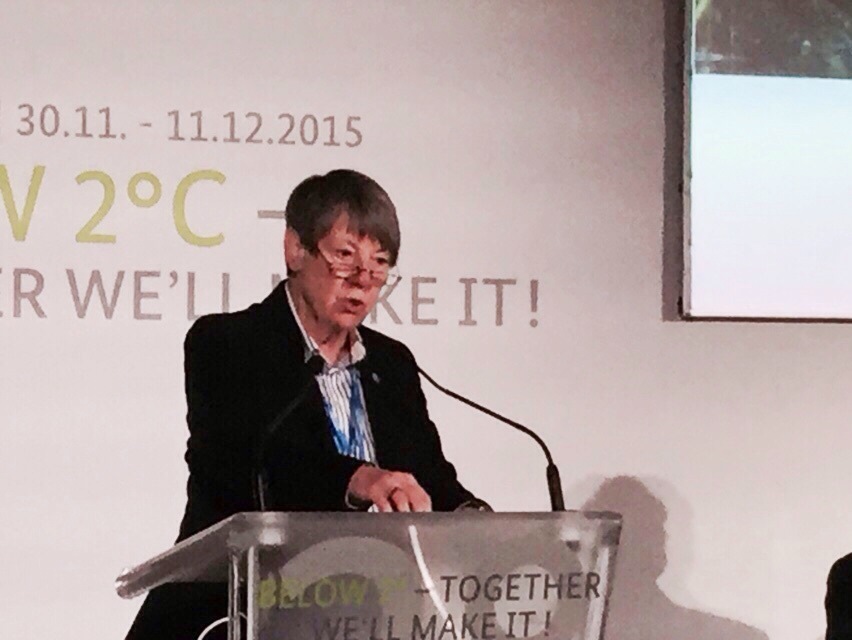New Pledges for Adaptation Fund at COP21 Reach Nearly US$75 Million
Paris, France (December 9, 2015) – Following a pledge from Sweden during the opening session of the Climate Conference in Paris last week, the Adaptation Fund received three additional boosts from other contributor countries on December 8 recognizing the Fund’s pivotal role in financing concrete adaptation and resilience projects in the most vulnerable countries. Germany announced a major new pledge of 50 million euros (US$54.5M) for the Fund in 2015 and contributions of 2 million euros (US$2.2M) were also received from first-time Fund donor Italy, as well as 1 million (US$1.1M) from the Belgian region of Wallonia.
“Many countries in the South value the multilateral Adaptation Fund because it is administered by donors and recipients as equal partners,” said Germany’s Minister of the Environment Barbara Hendricks in a Dec. 8 release. “It gives accredited implementing entities direct access to funding. This shows that we are taking the needs of poorer countries seriously. They need concrete assistance in adapting to climate change.”
The Adaptation Fund has been heralded for its ground-breaking work on adaptation, including pioneering direct access which provides targeted national support. “I hope that this signal brings fresh impetus to the negotiations in Paris,” added Hendricks.
Germany said adaptation is an important issue for all countries and recognized the Adaptation Fund for channeling funds to concrete adaptation projects. Germany made clear it had evaluated the Fund as being effective and functioning. “The work of the Fund is relevant and needed,” said Deputy Director General for Climate Policy, German Ministry of the Environment Berthold Goeke at an Adaptation Fund event during COP21 Dec.8.
Isabella Lövin, Sweden’s Minister for International Development Cooperation, said she had hoped Sweden’s US$17 million pledge Nov. 30 would spur other donors to come forward to support the Adaptation Fund. She added that addressing climate change and adaptation is linked to fighting poverty. “It’s about building resilient societies,” she said. “The Adaptation Fund is key in creating the necessary trust between rich and poor countries. The Adaptation Fund plays an important role in climate finance. Its Direct Access modality has an immense value in building capacity and country ownership and contributes to real change in vulnerable societies.”
Adaptation Fund Board Chairman Hans Olav Ibrekk was encouraged by the new pledges. “It was great to see this wave of recognition by our generous contributors, including a first-time donor, in acknowledging the Fund is producing effective results on the ground, is in higher demand now more than ever and is at a decisive moment as we seek sustainable funding streams and a solid COP agreement that will help us reach more vulnerable communities,” he said.
The Adaptation Fund has allocated US$331 million to 51 concrete adaptation projects in 45 countries, benefiting over 3.5 million people across a range of sectors, including coastal zone management, sustainable agriculture, water security and disaster risk reduction. Demand for projects is high, with a record 40 individual project ideas submitted last period.
A recent independent evaluation confirmed the Fund’s adaptation efforts are effective and relevant and the Fund’s pioneering ‘Direct Access’ feature, which allows countries to access finance and develop projects directly through accredited National Implementing Entities (NIEs), represents a major advance in climate finance.
Marianella Feoli, Director of Fundecooperacion, Costa Rica’s NIE, said Adaptation Fund support has helped the country move from tackling emergencies to prevention and adaptation. She said Direct Access leads to improved institutional organization, strong involvement of local stakeholders, cooperation with other agencies and serves as a catalyst to localized, well-managed and impactful adaptation actions that can be multiplied. The Fund also promotes communication with other NIEs to share best practices. The Adaptation Fund project in Costa Rica to reduce climate vulnerabilities on agriculture, water resources and coastlines is under its first year of implementation, but is already producing concrete results, she added. For example, Vitalina Aguilar’s farm was getting flooded every year until she implemented a drainage system and improved soil handling that reduced losses and produced better yields.
Meanwhile Dethie Soumare Ndiaye, Climate Finance Unit Coordinator for the NIE Centre de Suivi Ecologique which implemented a successful coastal zone management Adaptation Fund project in vulnerable areas of Senegal to prevent coastal surges from damaging local businesses, fisheries and rice fields, said Direct Access was a unique, innovative opportunity for Senegal to develop its own adaptive capacity, climate projects and good fiduciary, social and environmental risk policies. “It’s a huge expertise we gain,” he said. “It’s a good quality program. For us, Senegal and other developing countries, the Adaptation Fund is something very important in the Climate Finance architecture. It needs to be made permanent.”
ABOUT COP 21
The 21st session of the Conference of the Parties (COP) to the United Nations Framework Convention on Climate Change (UNFCCC) is taking place from November 30 to December 11, 2015, in Paris, France. With 196 member nations, the UNFCCC seeks a binding, universal climate change agreement that stabilizes greenhouse gas emissions at levels that prevent dangerous human interference with the climate system while also helping countries adapt to the effects of climate change already impacting vulnerable populations throughout the world. It is now recognized that adaptation is equally important as mitigation in addressing climate change but requires significant additional resources to meet a growing and urgent demand for climate adaptation projects. The Adaptation Fund is an active participant during COP 21, hosting side events and related activities.
ABOUT THE FUND
The Adaptation Fund was established under the Kyoto Protocol of the UN Framework Convention on Climate Change, and since 2010 has committed US$331 million to support 54 countries. To date, 51 concrete climate adaptation and resilience projects have been approved, with the majority in the implementation stage. Please visit www.adaptation-fund.org for more information.
Communications Contact:
Matthew Pueschel, mpueschel@adaptation-fund.org or +1 202.473.6743
Attachments
| Attachment | Type | Size |
|---|---|---|
| 120915_New Pledges for AF at COP21 Reach Nearly US 75 Million | 172 KB |


